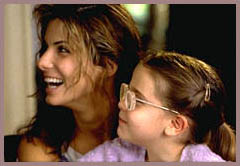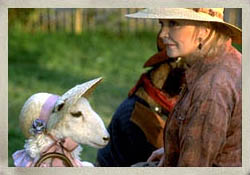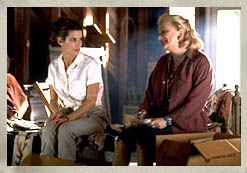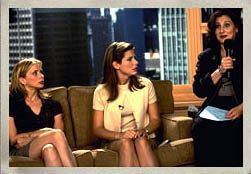![[safe]](safe.gif)

Hope Floats

Starring Sandra Bullock, Harry Connick Jr, Gena Rowlands,
Mae Whitman, Cameron Finley, Michael Pare
Directed by Forest Whitaker
![[safe]](safe.gif)


The last few films we've seen Sandra Bullock in, she's been chafing at
the "nice girl, sweetheart" image she created for herself through films
such as "While You Were Sleeping" and "The Net". Even a return to the
character of Annie in "Speed 2" did nothing to revive the box office. It
seemed audiences had become tired of her shtick. With "Hope Floats",
however, Bullock has taken on a character that is an extension of her
previous roles - imagine an older, wiser, somewhat damaged version of the perky romantic heroines she's played in the past, and that about
sums up Birdee Pruitt, the woman who's been publicly humiliated over
national television when her husband (Michael Pare) and best friend (an
uncredited Rosanna Arquette) reveal their affair on a lurid talk show.
the perky romantic heroines she's played in the past, and that about
sums up Birdee Pruitt, the woman who's been publicly humiliated over
national television when her husband (Michael Pare) and best friend (an
uncredited Rosanna Arquette) reveal their affair on a lurid talk show.
Shamed into leaving her heartless spouse, Birdee takes her daughter Bernice (Mae Whitman) back to Smithville, the small town she grew up in, to live with her mother (Gena Rowlands) and try to start life anew. Things between Birdee and her mom, however, have always been tense. Because she is an eccentric collector of stuffed animals with a penchant for saying what's on her mind and outlandish clothing, Birdee's always been a little ashamed of her mother, and coming home brings back memories of when her efforts to be accepted and liked in spite of her background led to her being the high school Prom Queen, the most popular and audacious girl in town who might some times have been mean to the lesser denizens of her community. With her father tucked away in a home due to a stroke and lost to Alzheimer's, Birdee feels isolated and alone. It isn't long before Justin, an old high school acquaintance, comes courting, and tensions between Birdee and Bernice begin to flare as the younger girl tries to reunite her father and mother.
The script by Steven Rogers is filled with cliches and inexplicable details, for example, how does Birdee and her mother maintain the large palatial house they live in with no discernible income, or how Justin can afford to build his own home by simply being the town handyman. These lapses in logic are frequently jarring, especially because director Forest Whitaker takes such a slow, easy pace that questions are given time to arise and fester in the minds of the audience. This film is similar in theme and spirit to "Waiting to Exhale", and Whitaker shows signs of repetition as a director. The fact that the material is more condensed, focussing on only one protagonist, and set in the rural South with an all-white cast, however, suggests that this is but a stepping stone for him in his directorial resume, an effort to expand his credibility by essentially repeating what he did so well previously in a different context. "Hope Floats" suffers sometimes from heavy-handed melodramatic tendencies and plods along in some stretches. Editor Richard Chew, who did such great work in "Grace of My Heart" has been given instructions to suddenly use slow motion cutting techniques now and then to highlight significant moments - this gives the film a TV movie feel which really detracts from its other qualities.


Although "Hope Floats" has been sold as a romantic drama, the relationship between Justin and Birdee is too laden with plot holes to make much sense. The tensions and history between them are never fully explained, and Justin becomes nothing more than a mouthpiece for homilies and affirmations of faith and love toward Birdee. The resolution of their courtship seems patently fake and unbelievable because it is precipitated by so many signs to the contrary. Things are not helped by Harry Connick Jr's stilted performance. He makes Justin seem like a cipher rather than a character, bland and uninteresting.
What the film gets right, instead, is the web of familial relationships
between grandmothers, mothers and daughters, and to a lesser but no less
moving extent, between fathers and daughters. The script displays a
strong understanding of the complex and stormy ties between the three
generations of women in the family, and it is this element of the story,
rather than the tacky romance, which elevates the film from the junk
heap. Beautifully written lines are done great justice by Bullock,
Rowlands and Whitman. Rowlands again plays a feisty matriarch with a
tough exterior and a heart of gold; her lines are somewhat corny because
 she is always spouting metaphorical sayings, but Rowlands makes her a
character we come to admire and respect. Whitman, who last appeared in
"One Fine Day" also displays an astonishing range. The role of Bernice
is written realistically and she manages to give a nuanced and layered
performance, avoiding the cloying rut that most child actors tend to
fall into. Bullock, too, is quite a revelation here. Downplaying her
tendency to be coy and sweet, she makes Birdee a believable and
vulnerable character that we root for. Going beyond what she's done
before, this role marks an important turning point for her career,
signaling that she can do drama and that there is life after romantic
comedies.
she is always spouting metaphorical sayings, but Rowlands makes her a
character we come to admire and respect. Whitman, who last appeared in
"One Fine Day" also displays an astonishing range. The role of Bernice
is written realistically and she manages to give a nuanced and layered
performance, avoiding the cloying rut that most child actors tend to
fall into. Bullock, too, is quite a revelation here. Downplaying her
tendency to be coy and sweet, she makes Birdee a believable and
vulnerable character that we root for. Going beyond what she's done
before, this role marks an important turning point for her career,
signaling that she can do drama and that there is life after romantic
comedies.
Ultimately, "Hope Floats" tries too hard to be a glossy romantic
feature. What it should have concentrated on was the fascinating and
rich material in the story between Birdee and her own family. As it is,
there is enough on screen to capture our imaginations and elicit our
compassion and feeling for Birdee, but there are also enough elements to
irritate and frustrate the intelligent viewer.